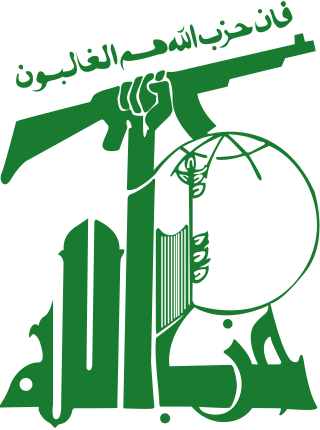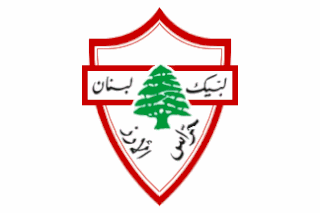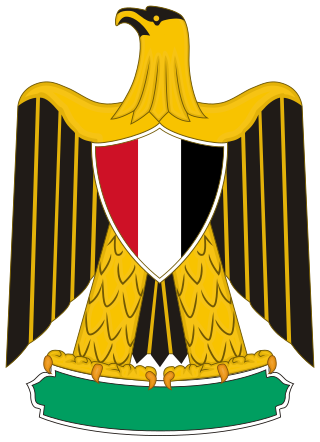| |||||
| Decades: | |||||
|---|---|---|---|---|---|
| See also: | |||||
The following lists events that happened during 1993 in Lebanon .
| |||||
| Decades: | |||||
|---|---|---|---|---|---|
| See also: | |||||
The following lists events that happened during 1993 in Lebanon .

Hezbollah is a Lebanese Shia Islamist political party and paramilitary group. Hezbollah's paramilitary wing is the Jihad Council, and its political wing is the Loyalty to the Resistance Bloc party in the Lebanese Parliament. Its armed strength was assessed to be equivalent to that of a medium-sized army in 2016.

The Lebanese Civil War was a multifaceted armed conflict that took place from 1975 to 1990. It resulted in an estimated 150,000 fatalities and led to the exodus of almost one million people from Lebanon.

The Guardians of the Cedars was a far-right ultranationalist Lebanese party and former militia in Lebanon. It was formed by Étienne Saqr and others along with the Lebanese Renewal Party in the early 1970s. It operated in the Lebanese Civil War under the slogan: Lebanon, at your service. The militia was explicitly anti-Palestinian, and gained a reputation for brutality against Palestinian fighters and civilians.

The Safavid order, also called the Safaviyya, was a Sufi order (Tariqa) founded by the Kurdish mystic Safi-ad-Din Ardabili. It held a prominent place in the society and politics of North Western Iran in the fourteenth and fifteenth centuries, but today it is best known for having given rise to the Safavid dynasty.

The Syrian Social Nationalist Party is a Syrian nationalist party operating in Syria, Lebanon, Jordan, and Palestine. It advocates the establishment of a Greater Syrian nation state spanning the Fertile Crescent, including present-day Syria, Lebanon, Iraq, Kuwait, Jordan, Palestine, Israel, Cyprus, Sinai, Hatay Province, and Cilicia, based on geographical boundaries and the common history people within the boundaries share. It has also been active in the Syrian and Lebanese diaspora, for example in South America, and as of 2020 is the second-largest political party in the pro-Assad National Progressive Front.

The Amal Movement is a Lebanese political party and former militia affiliated mainly with the Shia community of Lebanon. It was founded by Musa al-Sadr and Hussein el-Husseini in 1974 as the "Movement of the Deprived." The party has been led by Nabih Berri since 1980. The Greek Catholic Archbishop of Beirut, Grégoire Haddad, as well as Mostafa Chamran, were among the founders of the movement.

Nasserism is an Arab nationalist and Arab socialist political ideology based on the thinking of Gamal Abdel Nasser, one of the two principal leaders of the Egyptian Revolution of 1952, and Egypt's second President. Spanning the domestic and international spheres, it combines elements of Arab socialism, republicanism, secularism, nationalism, anti-imperialism, developing world solidarity, Pan-Arabism, and international non-alignment. According to Mohamed Hassanein Heikal, Nasserism symbolised "the direction of liberation, socialist transformation, the people’s control of their own resources, and the democracy of the peoples working forces."

Zuheir Mohsen was a Palestinian Politician who was the leader of the Ba'athist As-Sa'iqa faction of the Palestine Liberation Organization (PLO) between 1971 and 1979.

On July 25, 1993, Israeli forces launched a week-long attack against Lebanon named Operation Accountability in Israel and the Seven-Day War in Lebanon. Israel specified three purposes to the operation, to strike directly at Hezbollah, to make it difficult for Hezbollah to use southern Lebanon as a base for striking Israel, and to displace Lebanese and Palestinian civilians in the hopes of pressuring the Lebanese government to intervene against Hezbollah. The affected civilian population included both Lebanese and Palestinian people.
Confessionalism is a system of government that is a de jure mix of religion and politics. It typically entails distributing political and institutional power proportionally among confessional communities.

The flag of Hezbollah is the flag of the Shi'a political and military organization Hezbollah. The flag depicts a stylized representation of the Arabic words حزب الله in Kufic script. Written near the first letter of the word Allah, there is a hand that reaches up to grasp a stylized assault rifle. The flag incorporates several other symbols, namely a globe, a book, a sword, and a seven-leafed branch. The text above the logo reads فإن حزب الله هم الغالبون and means "Then surely the party of God are they that shall be triumphant", which is a reference to the name of the party. Underneath the logo are the words المقاومة الإسلامية في لبنان, meaning "The Islamic Resistance in Lebanon".

Hezbollah, a Shia Islamist political and militant group based in Lebanon, is driven by an ideology that combines religious, political, and social elements. Founded in the early 1980s, Hezbollah's ideology is deeply rooted in Shia Islam and influenced by the Iranian Revolution. Central to its ideology is opposition to Western influence and Israeli occupation, which it frames as a struggle for justice and liberation, while also positioning Islam as a comprehensive solution to social and political issues. Hezbollah's ideological framework is articulated through its foundational documents, such as the 1985 "Open Letter" and the 2009 "New Manifesto," which emphasize themes of anti-Zionism, anti-Americanism, and the establishment of an Islamic state governed by Sharia. The movement also advocates for pan-Islamism and pan-Arabism, promoting unity among Muslims and Arabs while supporting Iran as a model of sovereignty.
Subhi al-Tufayli is a Lebanese senior Shi'ite cleric and politician who founded the Hezbollah militant group in 1982 and was its first secretary-general from 1989 until 1991. From a comparatively young age, Tufayli achieved popular following amongst Lebanese Shi'ite community, who viewed him as the most learned Shi'ite scholar in the Beqaa Valley.

Lebanese nationalism is a nationalist ideology which considers the Lebanese people as a separate nation independent from the Arab world and strives to maintain Lebanon as an independent nation-state. The ideology may consider the Lebanese people to be direct descendants of the Phoenicians, a concept associated with Phoenicianism.
On the 30 of September 1992, a series of clashes in South Lebanon between Hezbollah and the South Lebanon Army killed 9 people, including one UNIFIL peacekeeper.

The Syrian Social Nationalist Party in Lebanon (SSNP-L) is a Syrian nationalist party operating in Lebanon. The Lebanese section of the Syrian Social Nationalist Party advocates subsuming Lebanon into a Greater Syrian nation state spanning the Fertile Crescent.

The Arab Nationalist Movement, also known as the Movement of Arab Nationalists and the Harakiyyin, was a pan-Arab nationalist organization influential in much of the Arab world, particularly within the Palestinian movement. It was first established in the 1950s by George Habash with the primary focus on Arab unity.

"Little Satan" is an anti-Zionist derogatory epithet used especially by Iranian leaders for Israel.